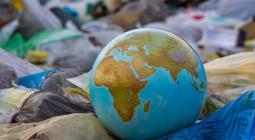But documents filed in California in September, where the attorney general, Rob Bonta, is suing ExxonMobil, argue the company has deceived the public for 50 years, with misleading public statements and slick marketing, about the recyclability of plastic.
The UN treaty talks start as plastic production continues to soar. Between 2000 and 2019 the global annual production of plastics doubled, reaching 460m tonnes. Plastic waste has more than doubled, from 156m tonnes in 2000 to 353m tonnes in 2019, only 9% of which was ultimately recycled, according to an OECD report.
An AEPW spokesperson said: “No single organisation can solve the plastic waste challenge alone and the Alliance is cognisant of the fact that we are just one among many stakeholders who contribute with solutions … our mandate is to identify solutions that support the collection, sorting and recycling of plastic and promote a circular economy for plastics.”
ExxonMobil said in a statement: “Plastics aren’t the problem – plastic waste is. We support a broad set of solutions to address plastic waste and are doing our part to contribute, including through advanced recycling, the Alliance to End Plastic Waste, and by supporting the global treaty’s goal of eliminating plastic pollution by 2040.
“Instead of suing us, California officials could have worked with us to fix the problem and keep plastic out of landfills … We’re bringing real solutions, recycling plastic waste that’s difficult to recycle by traditional methods … We have been direct with our customers about the plastics and products we sell. We stand by our public statements.”
Shell and TotalEnergies declined to comment. ChevronPhillips and Dow did not respond to approaches for comment.
The American Chemistry Council said: “In January 2019 ACC and its members launched the AEPW to help end plastic pollution. For years AEPW has operated as an independent and separately incorporated organisation. ACC has no role in AEPWs governance or decision-making.”





